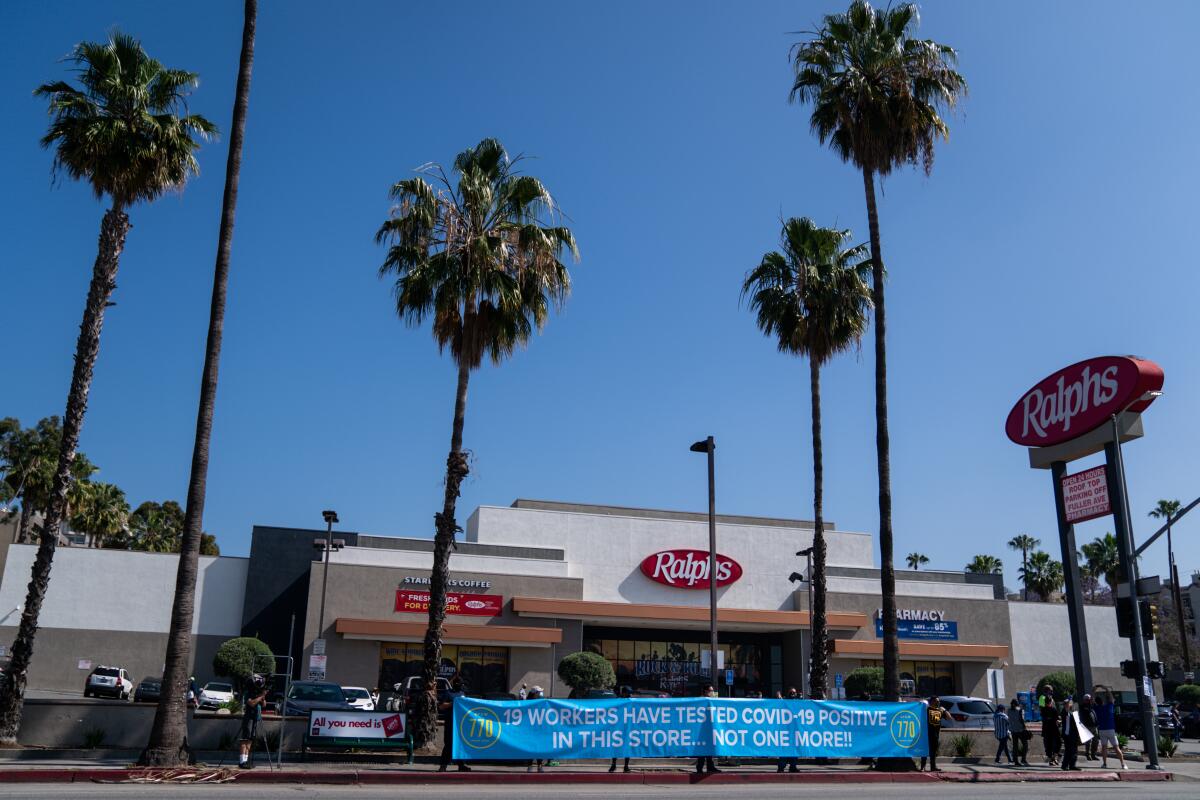Ralphs illegally denied jobs to formerly incarcerated people, civil rights lawsuit alleges

- Share via
Grocery company Ralphs illegally denied jobs to hundreds of people based on their criminal history, California’s Civil Rights Department alleges in a new lawsuit.
The lawsuit, filed Thursday in Los Angeles County Superior Court, is the first of its kind under California’s Fair Chance Act, which went into effect in 2018 and limits the use of conviction history in hiring decisions in an effort to reduce barriers and combat discrimination that formerly incarcerated people face when looking for work.
Ralphs included questions about applicants’ conviction histories on its job application in violation of the law and failed to individually assess whether each applicant’s conviction history justified denying them a job under standards set by the Fair Chance Act, the complaint alleges.
As a result, Ralphs “refused to hire hundreds of applicants whose conviction histories do not justify denying them positions,” according to the lawsuit. These violations are ongoing, according to the complaint.
The Civil Rights Department is seeking monetary damages for the workers who were denied jobs or lost jobs as a result of Ralphs’ screening practices and a court order to require Ralphs to come into compliance with the law.
“When roughly 70 million Americans have some sort of record, policies like those employed by Ralphs aren’t just discriminatory and against California law, they don’t make sense,” said Kevin Kish, director of the Civil Rights Department, according to a Thursday news release about the lawsuit. “We can’t expect people to magically gain the economic and housing stability needed to reintegrate into their communities and stay out of the criminal legal system without a fair chance at steady employment.”
Salvador Ramirez, a spokesperson for Kroger, the parent company of Ralphs, did not respond to a request for comment.
The Fair Chance Act prohibits employers with five or more employees from asking about a job applicant’s criminal history before making a conditional job offer, and sets in place specific procedures for considering an applicant’s criminal history after a job offer is made. Under the law, employers can decide against hiring an applicant only because of a conviction that has a direct relationship with job responsibilities.
The law also requires that companies provide notice of decisions to deny applicants positions on the basis of their conviction histories, and gives applicants the ability to respond to these preliminary decisions.
Ralph did not do this, according to the Civil Rights Department. More than 75% of job applicants who were told their job offer would be withdrawn were not provided any way to contact Ralphs to contest the decision, as legally required by the Fair Chance Act, the department said.
“Ralphs has continued to unlawfully deny jobs to qualified candidates and that’s why we’re taking them to court,” Kish said in his Thursday statement.
The Civil Rights Department said that since the law went into effect in 2018, it has investigated hundreds of complaints alleging discrimination in employment decisions based on criminal history information and secured roughly 70 settlements on behalf of affected individuals. Settlements include a nearly $100,000 mediated settlement with the Moraga-Orinda Fire Protection District earlier this year as well as a $100,000 settlement last year with a construction company that allegedly unlawfully denied a group of applicants positions between 2018 and 2019.
The department said it also has made efforts to identify and correct online job advertisements that violate the Fair Chance Act, sending notices to businesses to address hundreds of violations.











